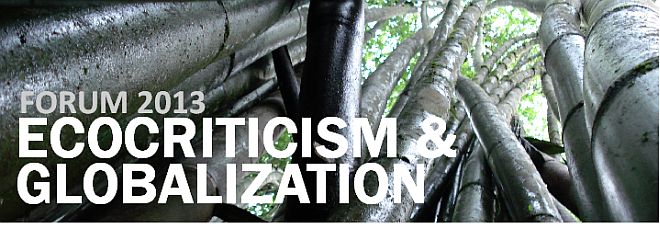From the Postgraduate Forum: Environment, Literature, Culture

Photo: docforumelc.wordpress.com

Photo: docforumelc.wordpress.com
June 21-22, 2013, Frankfurt a. M.
The first ELC workshop thematically focuses on “ecocriticism and globalization”. In a panel discussion and a reading session we want to explore the ways in which disciplinary paradigms of ‘ecocriticism’ change through its contact with globalization theories.
We would like to close in on concepts that try to move beyond the opposition of the ‘local’ as site of environmental affect and attachment and ‘the global’ as site of deterritorialized detachment. Efforts to interpret human environmental experiences with respect to their embeddedness in ecological, economic and political networks of global reach have given rise to eco-global concepts that transcend local determination, such as Ursula Heise’s “eco-cosmopolitanism” (2008) or Joni Adamson’s “eco-global perspectives” characteristic of “third wave ecocriticism” (2010). We are interested in ways in which an engagement with these terms can be made fruitful for literary and cultural studies.
This shift towards a ‘planetary’ perspective in ecocriticism registers contemporary processes, conditions, and consequences of globalization. Amongst those belong issues of environmental in/justice, global environmental risk, and postcolonial perspectives on environmental issues.
Furthermore, this shift of focus also means to engage with the representational challenges of thinking in unfamiliar scales of space and time. The slow violence of environmental injustice, for instance, very often lacks the dramatic spectacle that would be necessary to grip public attention in the fast-paced globalized world (Nixon 2011). We plan to take such considerations as a starting point for our discussions of how literary texts and other forms of cultural production manage to negotiate the experience of globalization processes in creative and imaginative ways. In order to do so, we will collectively discuss theoretical texts, thesis projects or parts and chapters of dissertations that deal with topics related to ‘ecocriticism and globalization’.
Some of the key questions to guide our discussion might be:
- How do the disciplinary paradigms of ‘ecocriticism’ change through its contact with globalization theories?
- How does the discipline itself become globalized? Is ecocriticism eventually moving away from its US-bias?
- In how far does a more global perspective force us to re-think terms such as ‘the global’, ‘globality’, ‘planetarity’ in ecocritical discourse? And what other terminology might be useful to discuss environmental literature from an eco-global perspective?
- How are concepts of place, space and locality transformed by globalizing processes?
- How do temporal conceptions change (e.g. in concepts like space-time-compression, global risk and slow violence)?
- In which ways is ecocriticism increasingly concerned with topics of global relevance (e.g. climate change)?
- Which (new?) narrative strategies are used to imagine notions of the global/ globality? Are we witnessing the engendering of new genres?
- How are categories of difference, such as identity, ethnicity, human and non-human, gender, or class reshaped and what kind of new power constellations and knowledge systems are being formed?
- How does migration change the experience of the environment?
Of course, this list is not exhaustive and contributions for discussion do not have to be limited to these topics.
If you are interested in participating, please send us an email until March 31st , 2013. We’d be happy if you could include a short biographical note and let us know what the topic of your current project is. If you want to actively contribute to the workshop, please send us either a text or a chapter of your dissertation (max. 30 pages, including bibliography!) or poster until May 19th (poster templates are available on request).
Please note: In order to finalize our preparations in time, we need to receive a final and binding registration by May 15th, 2013. Workshop space will be limited to 15 participants.
—
Download the Call for Papers as pdf.
Learn more about the Workshop Format, the Program and Logistics.









No comments:
Post a Comment